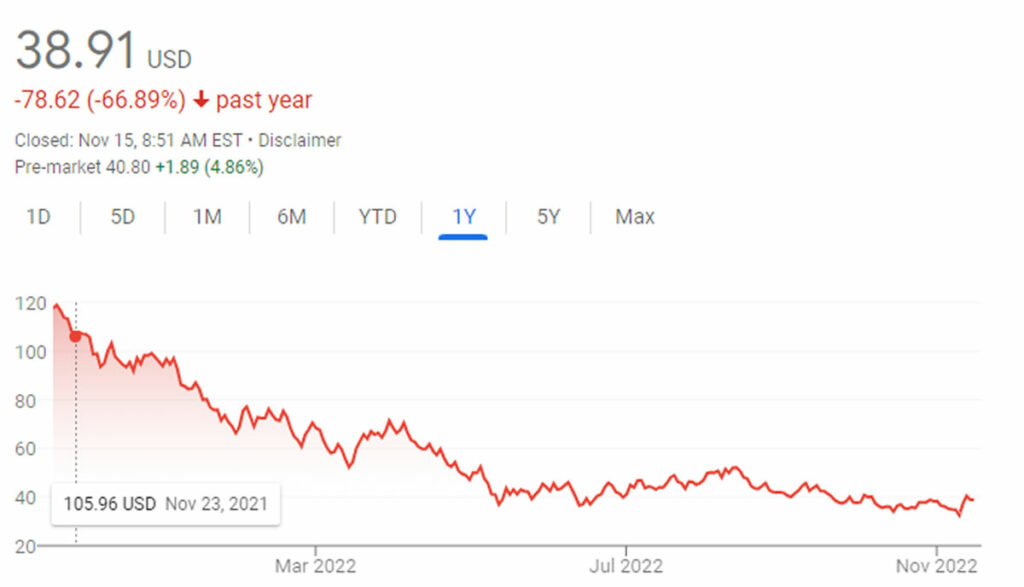The ARK Innovation Exchange-Traded Fund (ARKK), a complex, structured note offering, is at the center of a brewing storm of possible unsuitable sales. The ETF has significantly underperformed the broad market and has lost over 66% of its value at the start of the year.
Its volatility and riskiness have been borne out by its performance. That it is also incredibly non-diversified, with 10 companies accounting for almost 50% of its investments, makes the situation even worse.
Haselkorn & Thibaut (InvestmentFraudLawyers.com) is currently investigating investor losses caused due to unsuitability and/or over-concentration of ETFs by financial advisors. If you have losses caused by a financial advisor, please call us for a free consultation at 1-800-856-3352.
Investing in an unsuitable investment
Table of Contents
You may be eligible for compensation if you have lost money because of a poor investment decision. All or portion of the original investment could be returned as part of the settlement. To add insult to injury, the emotional toll of uncovering a broker’s deceit can be severe. Investing fraud is a problem for everyone, unfortunately. Claiming compensation could help Wall Street brokerage firms learn from their mistakes and stop taking advantage of future victims.
Brokers are responsible for learning about their client’s circumstances and providing recommendations that help them achieve their goals. A broker who steers a client into high-risk investments is working against the client’s best interests.
Identifying a fraudulent investment suitability broker
Being aware of the warning signs of a dishonest investment broker and your rights is crucial. The new SEC rules, known as Regulation Best Interest (BI), mandate that brokers serve their client’s best interests in order to safeguard ordinary investors from dishonest brokers. A Manhattan jury recently sided with the Securities and Exchange Commission (SEC) and concluded that broker Donald J. Fowler had overtraded his clients’ accounts. Although the broker reaped enormous profits from the plan, his clients suffered heavy losses.
Brokers that use investment suitability analysis are responsible for advising their clients solely on appropriate investments. Advice given must be based on a thorough investigation into the client’s financial condition, tax standing, and other relevant details. For instance, a broker who advises a conservative investor to buy speculative stocks is breaking suitability. The conservative investor’s daily needs must be met by the earnings of their investment portfolios. The conservative investor does not have the financial wherewithal to recover from a significant trading loss.
Remember that suitability claims are more involved than basic eligibility claims. Suitability claims require proof of the broker’s dishonesty, fraud, or manipulation. A broker’s general statement might not be misleading, but the claim is null and void if an investor only bases his suitability claim on that statement.
Claim of unsuitability
It is now emerging that a number of firms have targeted inexperienced customers, without either the risk appetite or depth of portfolio, for selling the ETF, against established norms of suitability for an investment of this nature. For instance, the ETF’s autocallable feature could crystallize losses for investors, pending certain triggers.
Investment fraud lawyers recently filed a Financial Industry Regulatory Authority (FINRA) lawsuit against San Mateo, CA-based financial advisor Weina Hou and Cetera Investment Services, the firm she is associated with, on behalf of a Chinese investor.
In the lawsuit, which claims up to a million dollars from Hou and Cetera, it has been contended by the investor that ARKK was an unsuitable recommendation into which she overconcentrated several hundred thousand dollars. Additionally, supporting the recommendation with claims of it being a low-risk investment was tantamount to omission and misrepresentation.
The claimant, with nil prior experience of investing, and limited ability in English, had been hitherto satisfied with investing in CDs. Cetera broker Weina Hou approached her and recommended this ETF, among others, as investments that would deliver better returns for no additional risk, communicating with her in Chinese.
The risks of investing in ARKK
Being illiquid, investments cannot be sold in times of need or when the investor wishes to exit. The ETF sought long-term growth through investments in domestic as well as overseas equity of companies answering to its theme of ‘disruptive innovation.’
The fund was up almost 300% from its previous year’s values when it was sold to this claimant. Its autocallable feature led to it dropping by around67% of its value the following year, wiping out much of this investor’s money. To make matters worse, her funds had been concentrated by the broker in multiple structured notes.
Professional support
While broker negligence may be a contributing factor, the primary issue seems to be more basic, why this illiquid and risky investment was marketed and sold to this investor. Commission earnings, no doubt, would be a reason, as, being a traded security, the advisor would earn a commission on sales.
On the part of Cetera, this case points towards a lack of supervision over the activities of this broker of the firm.
ETF Investor Loss Lawyer teams at Haselkorn & Thibaut have helped many investors mount claims against erring US-based brokers and their firms and recover losses amounting to over several million dollars.
Their clients include foreigners, including Chinese nationals placing their trust with brokers of Cetera, with some sharing language and culture. If you have sustained losses in ARK Innovation ETF, we encourage you to contact our experienced lawyers for a no-obligation case assessment at 1-800-856-3352.


